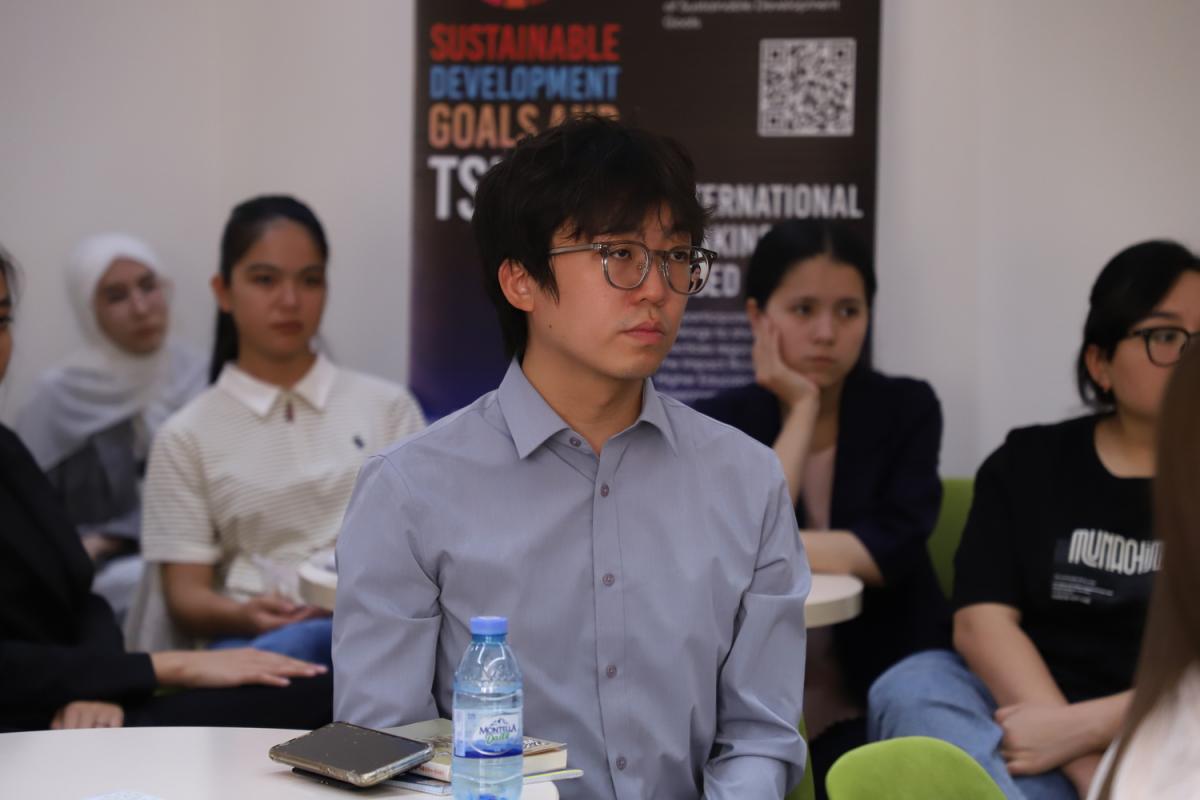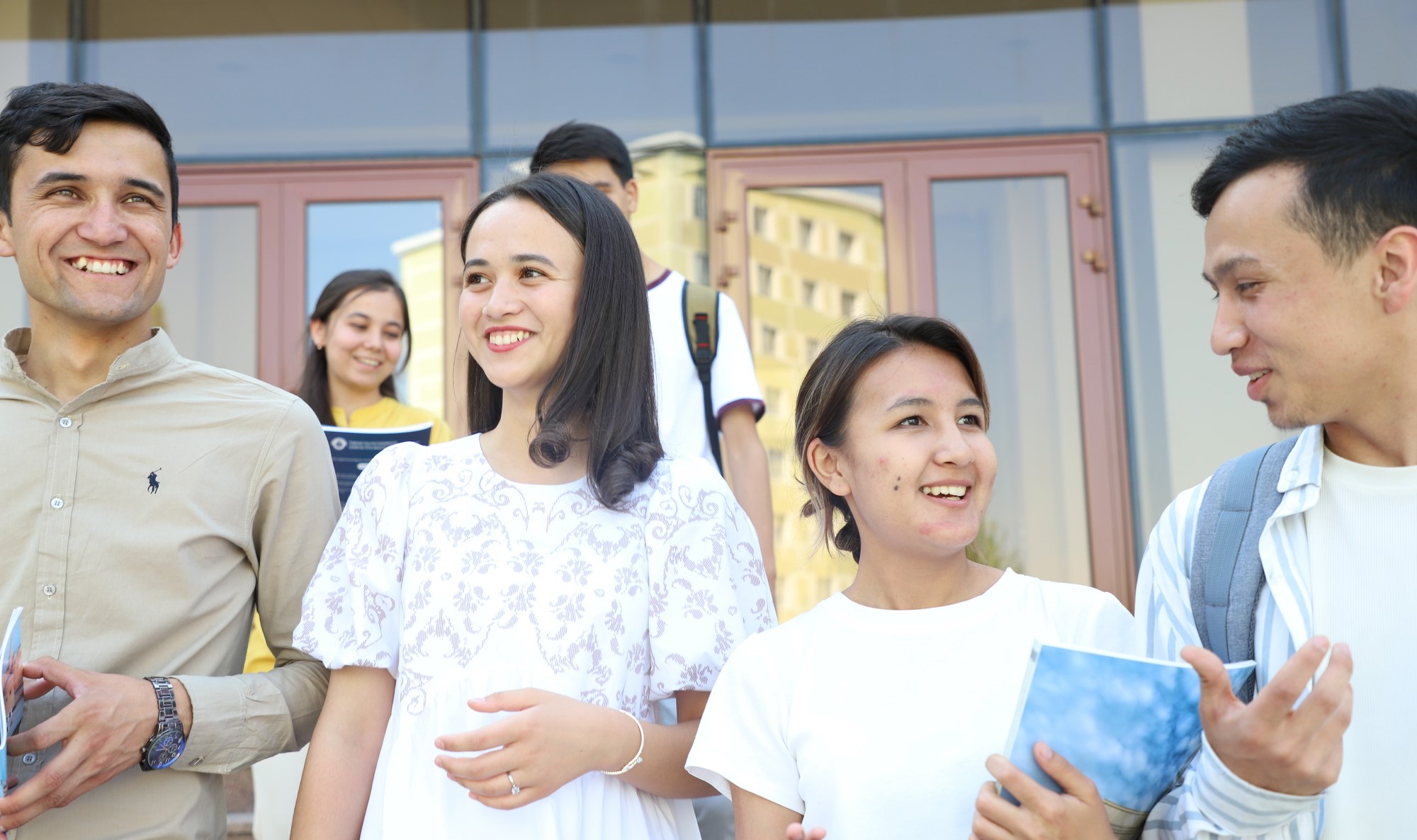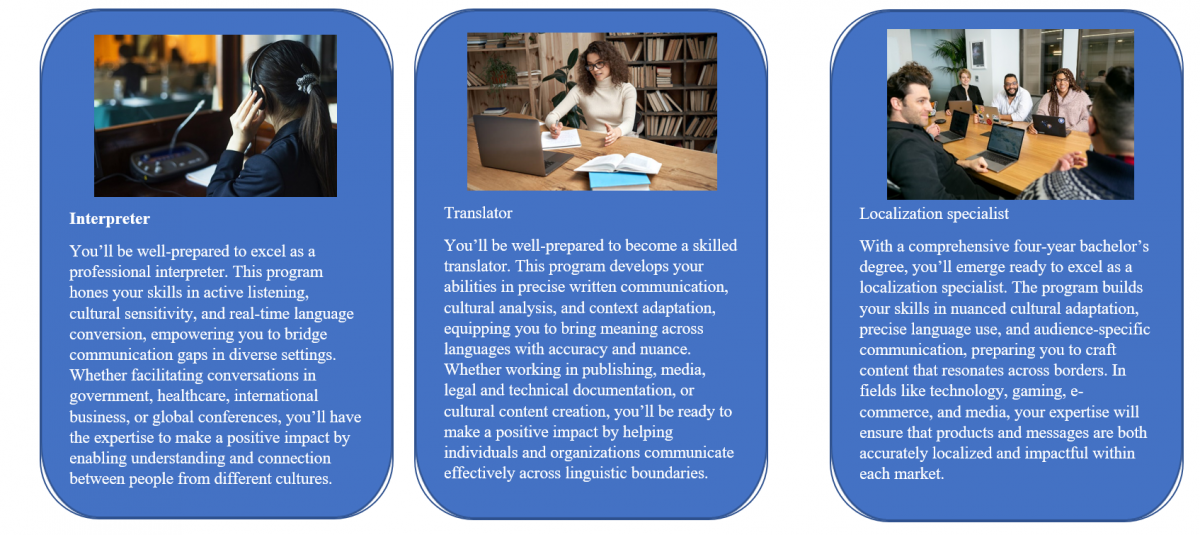This program offers in-depth training in both the theoretical and practical aspects of translation across English, German, Russian and French languages. This program is designed to develop advanced linguistic competence, cultural understanding, and specialized skills essential for professional translators. Students delve into the principles of translation theory, learning key strategies for accurately conveying meaning across linguistic and cultural boundaries. The curriculum includes rigorous coursework in comparative grammar, translation techniques, terminology management, and cultural nuances. Practical translation exercises allow students to work with various text types—from literary and technical documents to media and legal content—providing real-world experience and preparing them for diverse roles in international organizations, translation agencies, publishing, and more. Graduates emerge with the expertise to excel in the dynamic field of translation, backed by a solid foundation in both linguistic theory and applied translation skills.
Director of Academic Program
Dr Mahmadiyor Asadov
Study Mode
Four years full-time.
Program Structure
Qualification for this award requires the successful completion of 164 credit points including the subjects listed in the recommended sequence below.

Modular Learning Launching in 2025
Alisher Navoi Tashkent State University of Uzbek Language and Literature (TSUULL) is set to introduce modular learning at the University starting in 2025, offering a flexible and innovative approach to education.

The Physical Education and Sports program offers a broad understanding of physical fitness, athletic training, and the science of movement. Key areas of focus include exercise physiology, sports psychology, biomechanics, coaching techniques, and sports management. Designed to promote health and athletic excellence, the program equips students with both theoretical knowledge and practical skills in fitness training, injury prevention, and team leadership. Graduates are well-prepared for careers in sports coaching, athletic training, physical education, fitness consulting, and sports administration, ready to contribute to the promotion of health, wellness, and performance in various settings.
Level: Undergraduate Level 1 subject
The Information Technologies provides an in-depth understanding of the principles and practices related to computer systems, software development, and data management. It covers core areas such as programming, network administration, cybersecurity, database design, and artificial intelligence. The program is designed to equip students with both theoretical knowledge and practical skills needed for solving real-world technological challenges. Emphasizing problem-solving and innovation, it prepares students for various IT-related careers, including software engineering, systems analysis, IT project management, and data science. Graduates are well-positioned to contribute to the rapidly evolving digital landscape across multiple industries.
Level: Undergraduate Level 1 subject
The Uzbek (Russian Language) is an intensive course which includes the analysis of its structure, grammar and vocabulary, and in addition the elements of cultural and historical backgrounds. Basic fields are inter-sectional communication, translation, interpretation and analysis of the literature and comparative linguistics. Intending to develop an advanced level in both languages, the program provides realistic tools and knowledge for translating, diplomacy, business, and intercultural communication. Both in Uzbek and in Russian, graduates are ready to work in a global society as language and culture facilitators and mediators for business, education, and other human affairs.
Level: Undergraduate Level 1 subject
The Linguistics program provides a comprehensive exploration of language structure, meaning, and usage across different cultures and societies. Students gain a deep understanding of core linguistic areas such as phonetics, phonology, morphology, syntax, semantics, and pragmatics. The curriculum also covers sociolinguistics, psycholinguistics, and language acquisition, equipping students with the skills to analyze language patterns, language change, and the role of language in human cognition and social interaction. Through hands-on research and analysis, students engage with various languages and dialects, learning methods for data collection, linguistic analysis, and fieldwork. Graduates are prepared for careers in language research, education, translation, language technology, and other language-related fields, equipped to contribute insights and innovations to the evolving study of language and communication.
Level: Undergraduate Level 1 subject
The Main Foreign Language program, focusing on English, French, and German, is designed to provide students with advanced proficiency in their chosen language, along with a deep understanding of its cultural and historical context. Through intensive language instruction, students enhance their reading, writing, speaking, and listening skills, while also exploring literary works, media, and key cultural contributions associated with the language. The program covers essential elements of grammar, vocabulary, and pronunciation, combined with coursework on cultural studies and comparative linguistics. With immersive learning methods, including language labs, interactive seminars, and practical language use in real-life contexts, students are equipped for careers in translation, international relations, education, tourism, and other fields requiring multilingual expertise. Graduates leave the program ready to engage confidently and professionally in global and cross-cultural environments.
Level: Undergraduate Level 1-4 subject
The Translation Theory and Practice program immerses students in both the foundational theories and hands-on techniques essential for professional translation. Covering English, German, and French, the program emphasizes linguistic accuracy, cultural nuance, and effective communication across diverse contexts. Students explore translation theory, comparative linguistics, and text analysis, learning how to navigate challenges related to meaning, tone, and register. Practical components focus on translating different types of texts—such as literary, technical, and legal documents—using modern translation tools and software. Additionally, students gain insights into ethics in translation, project management, and client interaction, preparing them for a variety of roles in translation agencies, multinational corporations, publishing, and beyond. This program produces versatile translators equipped to meet the demands of an increasingly interconnected world.
Level: Undergraduate Level 1-4 subject
The Modern Uzbek Literary Language program delves into the evolution, structure, and stylistic features of contemporary Uzbek as used in literary and formal contexts. Students study the linguistic characteristics that define modern Uzbek, including phonetics, morphology, syntax, and lexicon, with a particular focus on literary language development in recent decades. The curriculum covers Uzbek literature, classic and modern texts, and examines the socio-cultural influences shaping language today. Through analysis of literary works, linguistic research, and practical exercises, students gain expertise in using Uzbek for literary creation, academic research, and professional writing. Graduates are prepared for careers in publishing, education, literary criticism, and fields that demand advanced language proficiency, helping to promote and preserve the richness of Uzbek language and literature.
Level: Undergraduate Level 2-3 subject
The Uzbek Literature program provides a deep exploration of the rich literary heritage of Uzbekistan, spanning from classical to modern works. Students engage with iconic Uzbek poets, writers, and scholars, studying the themes, styles, and cultural values reflected in their works. The curriculum includes analysis of major literary periods, including classical Chagatai literature, Soviet-era literature, and contemporary Uzbek prose and poetry. Through close readings, literary analysis, and historical context, students develop an understanding of the evolution of Uzbek literary expression and its role in shaping national identity. Practical courses in literary criticism, comparative literature, and translation equip students to approach Uzbek texts with a critical and global perspective. Graduates are well-prepared for careers in academia, publishing, translation, and cultural research, with a commitment to advancing Uzbek literature in diverse professional settings.
Level: Undergraduate Level 2-3 subject
The World Literature program offers an expansive study of literary works from diverse cultures and time periods, fostering a global understanding of storytelling and human experience. Students explore literature from various regions, including Western, Eastern, African, and Latin American traditions, delving into major genres, movements, and influential authors. The curriculum highlights comparative literature, cross-cultural themes, literary theory, and the historical, social, and political contexts that shape world literature. Through analysis of texts ranging from ancient epics to contemporary novels, students gain insights into universal themes, cultural exchange, and the evolution of literary forms. Practical coursework in literary criticism and research prepares students for careers in education, publishing, translation, and cultural organizations. Graduates emerge with a nuanced appreciation for the power of literature to connect and illuminate global perspectives.
Level: Undergraduate Level 1 subject
Philosophy gives a detailed analysis of the basic issues relating to life, knowledge and morality, and the world. This area includes basic topics like; Metaphysics, Epistemology, Ethics, Politics and logic. The rationale intended for the program is to foster the critical, analytical and intellectual skills, which are essential needed for students to study ideas and argue professionally. Stress is on reasoning and critical thinking, and the program is appropriate for students interested in careers such as researcher, lawyer, policy maker, journalist, and counselor. Graduates are ready to positively contribute to societal discussions, which will help to increase people’s knowledge about different fields of human thinking and activity.
Level: Undergraduate Level 1 subject
Religious Studies provides an analysis of the world religions, faith systems and function of religion in the society and culture. Some of the important themes it covers include; theology, scriptures, worship and rituals, ethics, and evolution of religions. The program aims at developing the students’ cognitive ability to analyze and to feel into different belief systems and to inform multicultural sensitivity. Focused on the religious impacts on major processes, it is designed for education, social work, interfaith dialogue, nonprofit organizations and cultural consultancy professional activity and further education. Graduates are thereby well prepared to respond constructively to questions about the role of religion in shaping humanity and its contribution towards the lived dimensions of meaning and forms of belonging.
Level: Undergraduate Level 2 subject
The Latest History of Uzbekistan program delves into the country’s recent historical developments, focusing on the social, political, and economic transformations from the late Soviet period to the present day. Core areas of study include the independence movement, post-Soviet state-building, cultural revitalization, economic reforms, and Uzbekistan's role in regional and global affairs. Designed to provide students with a nuanced understanding of contemporary Uzbek history, the program emphasizes critical analysis and research skills. Graduates are well-prepared for careers in fields such as academia, public policy, international relations, and cultural heritage, equipped to contribute to Uzbekistan's ongoing journey in a globalized world.
Level: Undergraduate Level 2 subject
The Second Foreign Language program, offering Arabic, Turkic, and French, is designed to equip students with proficiency in an additional language, broadening their linguistic and cultural horizons. Through structured language courses, students develop skills in speaking, reading, writing, and listening, along with an understanding of cultural contexts and traditions unique to each language. The curriculum includes grammar, vocabulary, and pronunciation, combined with exploration of each language's literature, history, and contemporary use. Practical language labs and immersive exercises enable students to apply their knowledge in real-life situations, enhancing cross-cultural competence. Graduates of the program are prepared for diverse career paths in international relations, translation, education, and cultural exchange, equipped with the tools to communicate effectively across linguistic borders.
Level: Undergraduate Level 3 subject
The Literary Translation program provides specialized training in translating literary texts across languages while preserving their artistic and cultural essence. Students learn to work with various literary forms—novels, poetry, plays, and essays—acquiring skills to convey tone, style, and nuance accurately in translation. The curriculum covers essential topics such as translation theory, comparative literature, and cultural adaptation, while practical workshops offer hands-on experience with different text types and genres. Courses on linguistic subtleties, idiomatic expressions, and cultural references equip students to handle complex translation challenges creatively. By analyzing and translating works from renowned authors, students gain a deep understanding of the literary process and develop a refined sensitivity to language. Graduates are prepared for careers in literary publishing, translation agencies, editing, and cultural organizations, contributing to the cross-cultural sharing of literature worldwide.
Level: Undergraduate Level 3 subject
The Foreign Language Lexicology program offers an in-depth study of the structure, meaning, and evolution of vocabulary in foreign languages, focusing on the intricacies of word formation, semantics, and etymology. Students explore how words develop, change, and interact within languages, examining topics such as morphology, word families, idioms, and collocations. The curriculum emphasizes the practical applications of lexicology, including dictionary creation, lexicon analysis, and the role of vocabulary in language acquisition. Through comparative studies and research projects, students analyze vocabulary from selected foreign languages, gaining skills in terminology management, lexicographic methods, and computational tools for lexicology. Graduates are equipped for careers in lexicography, translation, linguistics research, language education, and language technology, contributing to the creation and refinement of resources that support language learning and preservation.
Level: Undergraduate Level 3 subject
The Translation of Terms program focuses on the precise and accurate translation of specialized vocabulary across fields such as science, technology, law, and business. This program equips students with skills to navigate complex terminology, ensuring that concepts are effectively conveyed without loss of meaning or nuance. Coursework covers terminological research, database management, and comparative analysis across languages, emphasizing the importance of context, industry standards, and cultural sensitivity in term translation. Practical training includes the use of translation software, terminology databases, and glossaries, preparing students to work in sectors requiring expert-level term management. Graduates are ready for roles in technical translation, localization, lexicography, and project management, making significant contributions to fields where precise communication is essential.
Level: Undergraduate Level 4 subject
The Translation of Sectoral Texts program provides specialized training in translating industry-specific documents across fields like medicine, law, finance, technology, and environmental science. Students learn to accurately translate specialized terminology, adapt to the stylistic conventions of each sector, and maintain clarity while addressing the unique requirements of technical and professional texts. The curriculum covers document analysis, sectoral terminology, quality assurance, and regulatory standards, along with hands-on experience using translation tools and software. Through practical exercises, students develop expertise in translating reports, manuals, contracts, and other documents critical to specific sectors. Graduates are equipped for careers in technical translation, localization, editing, and consulting, bringing precision and expertise to roles where accurate translation of sectoral knowledge is essential for global communication.
Level: Undergraduate Level 4 subject
Career Opportunities
This program enhances creativity, critical thinking, and cross-cultural communication skills, equipping students with a versatile foundation for careers in translation and interpretation, international relations, diplomatic services, cultural organizations, and media. Graduates are prepared to excel in diverse fields, including publishing, linguistics, content creation, and global communications. The curriculum also provides valuable insights into fields like sociology, history, and anthropology, enriching students' understanding of the nuances essential to professional translation and cultural mediation..

Fees Indicative annual fee
$1.700*
This indicative annual fee is based on one year study load of 14 subjects (68 credit points)
If you are a domestic student, you can apply through our TSUULL Application system which is free of charge.
Domestic students are:
Scholarships
At Alisher Navo’i Tashkent State University of Uzbek Language and Literature, we are proud to offer a range of scholarships that acknowledge students with a deep commitment to the Uzbek language, literature, and culture. Our scholarships reward those who demonstrate academic excellence, active engagement within their communities, and outstanding leadership. Through donor-funded support, we also ensure that scholarships are accessible to students based on their academic achievements and financial needs. Additionally, specific scholarships are available for degrees in translation, linguistics, and Uzbek literature, fostering excellence and dedication to advancing Uzbek language and literature studies.
1. How long is the bachelor’s program?
The bachelor’s program is 4 years (full-time). Students complete a structured curriculum that builds on foundational courses in language and literature while allowing for specialization in later years.
2. How are assessments conducted?
Assessment in TSUULL's bachelor’s programs is diverse and may include exams, portfolios, project work, fieldwork, and practical tasks. The programs focus on authentic assessments to reflect real-world applications, with many tasks designed to develop essential skills like critical thinking, research, and time management. Additionally, teachers offer individual support through small, interactive classes, ensuring students have ample guidance throughout their studies.
3. Can I transfer between bachelor’s programs?
Yes, TSUULL allows students to transfer between bachelor’s programs. In the first year, students explore core subjects common across programs, which gives them a strong foundation and the flexibility to switch if they discover another program that better suits their goals. Credit for completed courses is generally transferable, so no time is lost.
4. What career opportunities are available after graduation?
A TSUULL bachelor’s degree opens doors to careers in education, translation, international relations, cultural institutions, and more. Graduates often find roles in translation and interpretation, publishing, media, and tourism, with their language skills and cultural knowledge highly valued by employers worldwide.
5. Are there scholarships available for foreign students?
Yes, TSUULL offers scholarships for international students based on academic performance and other achievements. Students interested in scholarships should apply early and check with the admissions office to understand the specific requirements and availability.
6. Does TSUULL offer internship or study abroad opportunities?
TSUULL has partnerships with universities and institutions abroad, allowing students to participate in exchange programs and internships. These opportunities provide valuable experience in different cultural and linguistic settings, often aligning with students’ studies and future career goals.